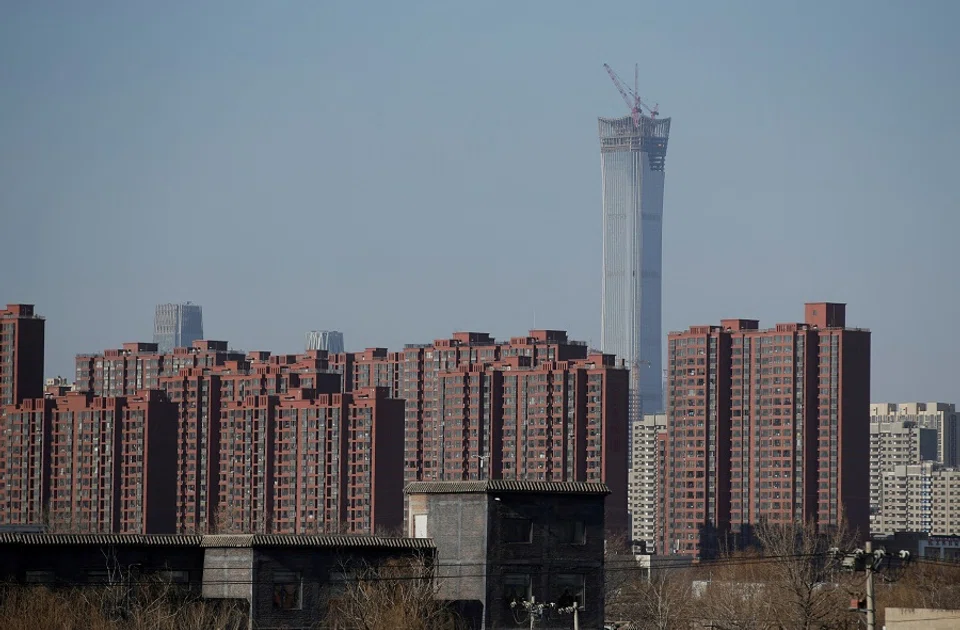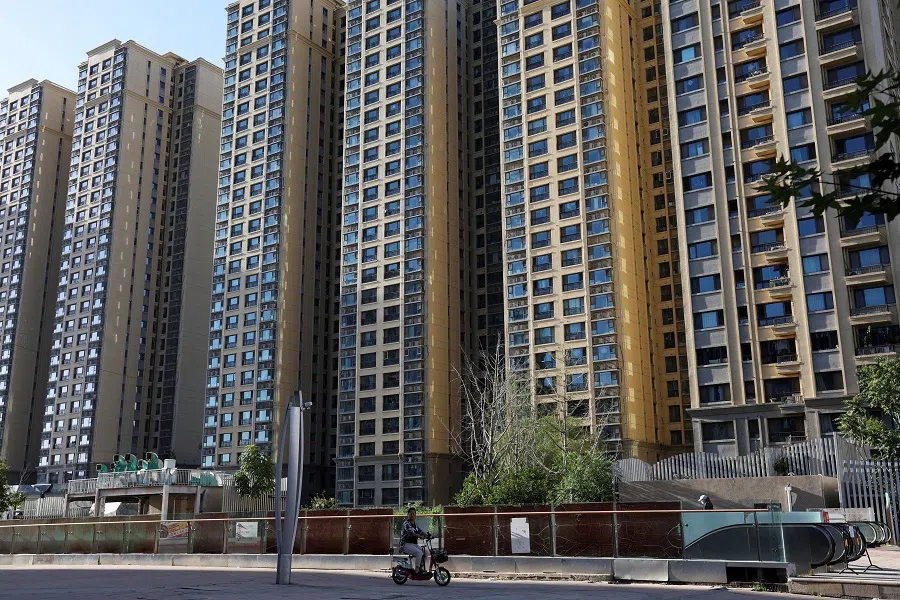Real estate sector in China's first-tier cities still in a slump
The real estate sector in China's first-tier cities such as Beijing and Shanghai has recorded declining performance since the pandemic, with a full rebound still nowhere to be seen. Given the usual lag in the effectiveness of policies after implementation, will the real estate market see a silver lining ahead? Lianhe Zaobao correspondent Chen Jing tells us more.

"Everyone thought that after loosening [pandemic restrictions], the market would rebound, but 2023 fared even worse than 2022."
Liu Yan (pseudonym), a real estate agent in Shanghai, told Lianhe Zaobao that the number of rentals she handled in 2023 dropped by 30% compared with 2022, and the cost of rental was also down 20-30% year-on-year. For the first time in her eight years in the industry, she got the sense that "Shanghai's houses are hard to lease".
Continuously falling rents
The cold wind in the real estate sector has spread from the property buying and selling market to the rental market. Even in first-tier cities which usually survived in bad times, rent prices continue to fall while the rate at which properties are being rented out are slowing in tandem.
Reports released in October 2023 by organisations such as Weifang Research Institute and Beike Research Institute on the developments in the housing rental market in China for 2023 revealed that the rental prices in 40 key cities in Q3 decreased on both quarter-on-quarter and year-on-year basis.
In 30 out of the 40 cities, rental prices went down compared with Q2, with the decline in first-tier cities greater than that in second-tier cities.
In the first half of 2023, rental prices in first-tier cities increased relative to prices at the end of 2022, with the largest increase seen in Beijing, at up to 5.03%. Even Shanghai, which had the smallest increase, saw growth of 1.93%.
But by Q3 2023, rental prices for first-tier cities fell quarter-on-quarter across the board, with the smallest decline seen in Shenzhen, down 0.93% compared with Q2 2023. Meanwhile, Beijing and Guangzhou saw quarter-on-quarter declines of 1.28% and 1.32% respectively, and Shanghai was hit the hardest, with a quarter-on-quarter decline of 2.12% in Q3 2023.
... among the foreigners who fled Shanghai to avoid the lockdown, not many returned after the pandemic, and fewer foreign employees were hired as part of the business decision. - Liu Yan (pseudonym), a real estate agent in Shanghai

According to data compiled by Beike Research Institute, renters in the 40 key cities in China paid an average of 2,967.8 RMB (US$414) in Q3 2023, a decline of 2.6% year-on-year and the lowest in the past five years. The year-on-year decline for first-tier cities reached 1.8%, with renters paying on average over 100 RMB less per month.
Going into Q4 2023, the rental market for first-tier cities showed even more signs of fatigue. Zhuge Real Estate Data Research Center's monthly report showed that as of November 2023, average rental prices in first-tier cities declined month-on-month for three months in a row and year-on-year for five years in a row. For two consecutive months, Shanghai and Beijing were on the list of top ten cities with a fall in month-on-month rental prices.
Extended vacancy time
At the same time, data from Beike showed that for the first ten months of 2023, the time frame for real estate transactions in Beijing, Shanghai, Guangzhou and Shenzhen increased by 6.1, 7.6, 5.4 and 3 days respectively year-on-year compared with 2022.
Once a property is listed on the rental market, it would take nearly one and a half months for a property in Beijing to be rented out, more than one and a half months in Shanghai, and more than two months in Shenzhen and Guangzhou. During the same period in 2019 before the pandemic, the transaction time for the four cities were all within 40 days.
The luxury rental sector that Liu works in was hit the hardest in the market. She stated that among the foreigners who fled Shanghai to avoid the lockdown, not many returned after the pandemic, and fewer foreign employees were hired as part of the business decision. Even internet celebrities and livestreamers, who frequently switched houses for filming purposes, have also cut down on consumption in 2023 and "avoided switching places as much as possible".
A Beijing real estate agent who has helped German automaker employees find rental apartments for several years also disclosed that despite there being more newcomers to Beijing after the inbound quarantine rules were lifted, it is still "outweighed by the people that have left".

The real estate agent pointed out that international travel restrictions during the pandemic forced many Chinese families to return home from overseas. Coupled with employees at foreign enterprises who have remained in Beijing, the overall rental market was relatively stable. But after restrictions were lifted in 2023, "many foreigners returned to their countries, and the Chinese people left too".
... the supply of units with a monthly rent between 10,000 RMB and 15,000 RMB far outstrips demand. Tenants are offered a plethora of choices, which has made them more selective.
Dual impact on supply and demand
Huang Tao, project manager at Centaline Property Agency in Guangdong, analysed in an interview that the bottoming out of the Chinese economy is concurrently affecting both the supply and demand sides of the rental market. In 2023, jobs were difficult to find and retrenchments rose, resulting in declining rental demand and budgets in large cities.
Meanwhile, falling home prices have made some homeowners shelve their plans to sell their homes and turn to the rental market instead, resulting in a continued increase in housing supply. "A rise in supply and a fall in demand led to declining rents," Huang said.
The impact of the weak economy and low expectations on the rental market is also reflected in the rising demand for more affordable rental apartments. Statistics from Beike Research Institute showed that in Q3, Shanghai's share of transactions for units with rents of less than 5,000 RMB increased nearly four percentage points, while Guangzhou's share of transactions for units with rents of less than 3,000 RMB grew 1.8 percentage points.
Bearing the brunt of the impact is the middle market. Liu pointed out that units with a monthly rent of 20,000 RMB or higher can still be rented out quickly if it is well renovated and in a prime location. However, the supply of units with a monthly rent between 10,000 RMB and 15,000 RMB far outstrips demand. Tenants are offered a plethora of choices, which has made them more selective.

She said, "Most apartments at this price range were originally put on [short-term rental platform] Airbnb to be rented out to foreign tourists. But few foreigners visit China nowadays, and even Airbnb has exited from the Chinese market, which makes it even more difficult to rent out these apartments."
In mid-December 2023, Beijing and Shanghai adjusted their definition of "ordinary housing" to no longer include a price limit and reduced homebuyers' down payment amount, driving a slight rebound in the sales of pre-owned homes. Analysts predicted that the rental market will see a subsequent decrease in the number of listings, which may lead to a rebound in rents in Beijing and Shanghai.
"...the market is in a vegetative state now - yes, it is alive, but it is only breathing and doing nothing else." - Liu
However, Huang thinks that whether it is renting, buying or selling, the property market is closely linked to the overall economic situation, and "it's going to take some time before it is out of the woods".
Liu predicts that the rental market will only gradually heat up in the second half of 2024.
She said, "Although the country repeatedly introduced stimulus policies to revive the housing market in 2023, the effects are not noticeable. Us real estate agents were jokingly saying among ourselves that the market is in a vegetative state now - yes, it is alive, but it is only breathing and doing nothing else. The impact of the anti-Covid measures in 2022 were only fully realised in 2023. I hope that the effects of the policies implemented in 2023 can be seen a year later."
This article was first published in Lianhe Zaobao as "中国一线城市租房市场入冬".



![[Big read] When the Arctic opens, what happens to Singapore?](https://cassette.sphdigital.com.sg/image/thinkchina/da65edebca34645c711c55e83e9877109b3c53847ebb1305573974651df1d13a)

